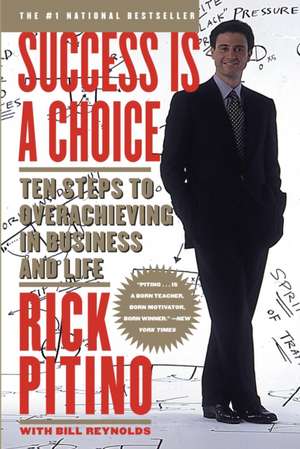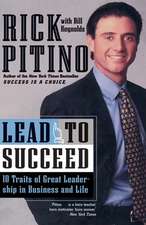Success Is a Choice: Ten Steps to Overachieving in Business and Life
Autor Rick Pitino Bill Reynoldsen Limba Engleză Paperback – 28 feb 1998
For Rick Pitino, the first coach to bring teams from three different schools to the Final Four, success isn’t about shortcuts. Pitino’s secret–and the reason he has become both a great coach and one of the most sought-after motivational speakers in the nation–is his strategy of overachievement. Now, in Success Is a Choice, he takes the same proven methods that have earned him and his teams legendary status and gives you a ten-step plan of attack that will help you become a winner at anything you set your mind to:
·Build your self-esteem
·Set demanding goals
·Always be positive
·Establish good habits
·Master the art of communication
·Learn from good role models
·Thrive on pressure
·Be ferociously persistent
·Learn from adversity
·Survive your own success
An inspiring program that is as fun to read as it is practical, Success Is a Choice can make the difference between achievement and failure in your own life.
“So much more than another Armani suit, Pitino has done a job of psychology and salesmanship that should serve as a how-to manual for his profession.” –Chicago Sun-Times
“Pitino’s track record is extraordinary . . . his personal style is also winning.” –Time
Preț: 107.46 lei
Nou
Puncte Express: 161
Preț estimativ în valută:
20.56€ • 22.33$ • 17.27£
20.56€ • 22.33$ • 17.27£
Carte disponibilă
Livrare economică 01-15 aprilie
Preluare comenzi: 021 569.72.76
Specificații
ISBN-13: 9780767901321
ISBN-10: 0767901320
Pagini: 288
Dimensiuni: 140 x 206 x 20 mm
Greutate: 0.25 kg
Ediția:Trade Pbk.
Editura: BROADWAY BOOKS
ISBN-10: 0767901320
Pagini: 288
Dimensiuni: 140 x 206 x 20 mm
Greutate: 0.25 kg
Ediția:Trade Pbk.
Editura: BROADWAY BOOKS
Extras
When I became the coach of Providence College in the spring of 1985, I was inheriting a program that had been languishing near the bottom of the very competitive Big East Conference ever since the conference began in 1979. I had been an assistant coach with the New York Knicks at the time, and there were people who warned me that the Providence job was a graveyard for coaches.
In one of my first meetings with the team, I listed four categories on the blackboard: basketball, school, work ethic, family. The four supposedly most important parts of my new players' lives.
"How many of you want to be professional basketball players someday?" I asked.
Virtually every hand in the room went up.
"Well, since you've had a losing season last year and there is no one here in this room who averaged at least ten points a game last year, it's obvious you are not a success in the basketball part of your lives," I said, erasing one quarter of the blackboard. "And since I've seen your grade point averages, it's also obvious you aren't successful in school either."
The room was silent as I erased another quarter of the blackboard. Then I turned to the trainer and asked him how many players had been in the gym every day since the season ended. I wanted to know how many had been working on their games.
"No one, Coach," the trainer said.
"So it's obvious you don't work hard either," I said, erasing another quarter of the blackboard.
Then I started raising my voice.
"Let's see," I said. "You aren't successful in basketball, you aren't successful in school, and you don't work hard. What's left?"
I paused for emphasis.
"Well, hopefully, you're a close team," I finally said. "Hopefully, you care about each other."
"Oh, we do, Coach," said a player named Harold Starks. "We're a close team."
I pretended to think for a minute.
"Okay, Harold, how many brothers does Steve Wright have?"
Starks slowly shook his head.
"What does Billy Donovan's father do for a living?"
Harold now looked like a deer stuck in the headlights.
"So you really don't know anything about each other, do you?" I asked.
No one spoke.
I made each player stand up and talk about himself and his family. Then something wonderful happened. What had been twelve individuals suddenly had become a cohesive unit. The makings of a team.
Twenty-two months later that collection of individuals--now a team--would be in the Final Four, the greatest stage in all of college basketball. The message I tried to communicate had started the players on the road to becoming a cohesive, hardworking group of people whose change in attitude about themselves as individuals had made all the difference.
Fiery speeches and locker-room dramatics can be effective and certainly have their place, but you have to remember that their message is essentially short-lived. True motivation must go way beyond that; it must make people understand the process required to achieve success. In this case, that message was the bonding of individuals sharing the same dreams and goals.
But the must important thing I learned was that the keys to performing well--on or off the court--were the same for all of us. Whether it's a college athlete playing at a level he never thought he could, or a salesperson striving to break records, or anyone taking more control of his or her life, the formula is the same.
Hard work and togetherness help us to soar to the next level.
Success means different things to different people. For some, it's money. For some, it's power. For others, it's the respect of their peers, or it's self-satisfaction. For many, it's the desire to have better relationships with the people in their lives.
Everyone wants to succeed, no question about that. Even people who are the most cynical and pessimistic. We all want to be more productive. We all want to feel as though we are reaching our full potential. We all want to feel as though we're controlling our destiny, that we're not being controlled by it.
I have often been approached to do a motivational book. Although I was convinced that I could tell people the correct way to go about achieving goals, I had always refused. Over the past several years, I have witnessed many rags-to-riches stories and have been around so many athletes who have gone on to accomplish things that even they once thought were impossible. Yet I have also seen promising people get swept up by victory and fall back into laziness and complacency. I have seen people face tough times and give up, shielding themselves with excuses you will never hear from people who are true lifelong winners. It is the knowledge I've gained from watching both these groups that makes me feel that I'm now ready to share what I've learned. You see, from these experiences and various efforts, it has been proven to me over and over that success is truly a choice for people, and there is a formula for a lifetime of successful behavior.
That can't be stressed enough.
We want to reach our dreams but often lack the proper direction necessary to see those dreams come true. We seem to be forever floundering without knowing why, our good intentions wasted, all but programmed for failure.
We all want to be recognized for what we do.
We all want to feel we have value.
The problem is that many of us don't know how to get there.
Most of us, of course, don't have a coach following us around in our lives to make sure we're on track. I hope that this book will be your own personal "coach" or tool for success.
It will show you how to create discipline in your life, establish a work ethic, create a sense of self-esteem in both yourself and others, learn how to fight through the inevitable adversity we all encounter in life, and be able to accomplish things you never dreamed possible.
All these goals are attainable, but each requires action and commitment.
It's up to you.
From the Hardcover edition.
In one of my first meetings with the team, I listed four categories on the blackboard: basketball, school, work ethic, family. The four supposedly most important parts of my new players' lives.
"How many of you want to be professional basketball players someday?" I asked.
Virtually every hand in the room went up.
"Well, since you've had a losing season last year and there is no one here in this room who averaged at least ten points a game last year, it's obvious you are not a success in the basketball part of your lives," I said, erasing one quarter of the blackboard. "And since I've seen your grade point averages, it's also obvious you aren't successful in school either."
The room was silent as I erased another quarter of the blackboard. Then I turned to the trainer and asked him how many players had been in the gym every day since the season ended. I wanted to know how many had been working on their games.
"No one, Coach," the trainer said.
"So it's obvious you don't work hard either," I said, erasing another quarter of the blackboard.
Then I started raising my voice.
"Let's see," I said. "You aren't successful in basketball, you aren't successful in school, and you don't work hard. What's left?"
I paused for emphasis.
"Well, hopefully, you're a close team," I finally said. "Hopefully, you care about each other."
"Oh, we do, Coach," said a player named Harold Starks. "We're a close team."
I pretended to think for a minute.
"Okay, Harold, how many brothers does Steve Wright have?"
Starks slowly shook his head.
"What does Billy Donovan's father do for a living?"
Harold now looked like a deer stuck in the headlights.
"So you really don't know anything about each other, do you?" I asked.
No one spoke.
I made each player stand up and talk about himself and his family. Then something wonderful happened. What had been twelve individuals suddenly had become a cohesive unit. The makings of a team.
Twenty-two months later that collection of individuals--now a team--would be in the Final Four, the greatest stage in all of college basketball. The message I tried to communicate had started the players on the road to becoming a cohesive, hardworking group of people whose change in attitude about themselves as individuals had made all the difference.
Fiery speeches and locker-room dramatics can be effective and certainly have their place, but you have to remember that their message is essentially short-lived. True motivation must go way beyond that; it must make people understand the process required to achieve success. In this case, that message was the bonding of individuals sharing the same dreams and goals.
But the must important thing I learned was that the keys to performing well--on or off the court--were the same for all of us. Whether it's a college athlete playing at a level he never thought he could, or a salesperson striving to break records, or anyone taking more control of his or her life, the formula is the same.
Hard work and togetherness help us to soar to the next level.
Success means different things to different people. For some, it's money. For some, it's power. For others, it's the respect of their peers, or it's self-satisfaction. For many, it's the desire to have better relationships with the people in their lives.
Everyone wants to succeed, no question about that. Even people who are the most cynical and pessimistic. We all want to be more productive. We all want to feel as though we are reaching our full potential. We all want to feel as though we're controlling our destiny, that we're not being controlled by it.
I have often been approached to do a motivational book. Although I was convinced that I could tell people the correct way to go about achieving goals, I had always refused. Over the past several years, I have witnessed many rags-to-riches stories and have been around so many athletes who have gone on to accomplish things that even they once thought were impossible. Yet I have also seen promising people get swept up by victory and fall back into laziness and complacency. I have seen people face tough times and give up, shielding themselves with excuses you will never hear from people who are true lifelong winners. It is the knowledge I've gained from watching both these groups that makes me feel that I'm now ready to share what I've learned. You see, from these experiences and various efforts, it has been proven to me over and over that success is truly a choice for people, and there is a formula for a lifetime of successful behavior.
That can't be stressed enough.
We want to reach our dreams but often lack the proper direction necessary to see those dreams come true. We seem to be forever floundering without knowing why, our good intentions wasted, all but programmed for failure.
We all want to be recognized for what we do.
We all want to feel we have value.
The problem is that many of us don't know how to get there.
Most of us, of course, don't have a coach following us around in our lives to make sure we're on track. I hope that this book will be your own personal "coach" or tool for success.
It will show you how to create discipline in your life, establish a work ethic, create a sense of self-esteem in both yourself and others, learn how to fight through the inevitable adversity we all encounter in life, and be able to accomplish things you never dreamed possible.
All these goals are attainable, but each requires action and commitment.
It's up to you.
From the Hardcover edition.
Descriere
The coast-to-coast bestseller that makes Rick Pitino--newly crowned head coach of the Boston Celtics--a reader's personal coach, "Success Is a Choice" features Pitino's ultimate ten-point program for winning the game of life. "Pitino is a proven winner".--"Boston Herald".



















